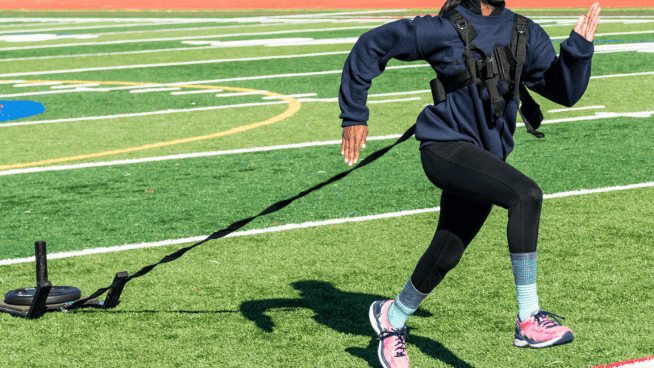Unfortunately, many athletes have experienced toxic teammates or bad team chemistry at one point or another.
Whether you know it or not, there’s a good chance these experiences can be attributed to “the drama triangle.”
The drama triangle is a social model of human interaction created by Dr. Stephen Karpman. The three roles that encapsulate the dreaded drama triangle are the victim, the persecutor and the rescuer. We assume these roles for selfish reasons, and each role plays off the others to create drama. We’ve all at some point played all these roles, and as soon as you find yourself inside the drama triangle, you fall victim to its dynamics.
The first way to escape the triangle is being able to recognize which of the three roles we most often find ourselves in.
The Victim feels helpless. They feel like nothing they can do will help, they feel powerless, they are challenged by small issues, they have a narrow perspective, and they often adopt a ‘Why Me’ attitude. They rely on the rescuer to come to their aid and do not want to face their problems head on. If they feel they aren’t being victimized, they’ll seek out a persecutor so they can continue to play the victim.
The Persecutor is authoritative. They act superior, they blame others, they’re critical, they’re controlling. This is the “I’m right, you are wrong” type.
The Rescuer looks for others’ problems to solve over facing their own. They enable the victim and feel guilty if they don’t help. While they love coming to the victim’s rescue, they only perpetuate their “always a victim” mindset. The reward for them constantly coming to the help of the victim is that they feel this entitles them to ignore their own problems. This is the “let me help you” archetype.
I believe if you are honest with yourself, you’ll spot the role you most often fall into. Now, the role you fall into may depend on your environment.
We enter the triangle when someone on our team takes on the role of the victim or persecutor. Then we emotionally drag others into the conflict, seeking a rescuer. As others get involved in the drama, we move about these roles depending on how situations play out. If the rescuer is always coming to the rescue, they are really becoming a victim of someone else’s inefficiencies. As conflict continues, you’ll work your way to each of the roles, leaving a trail of unproductive emotional waste.
Here’s how we defend the drama and get back on offense in life and on our teams.
If you frequently feel like a victim on your team, realize the truth and facts of the matter probably are not as bad as they seem.
- Look at things from the perspective of “What can I do to get better?”
- Reflect or journal on the positive things in your life.
- Share gratitude with the teammates who are there for you.
- Began to problem solve, no matter how small the steps you’re taking may seem.
If you frequently feel like a persecutor, realize this old saying often rings true: “If you aren’t helping solve the problem, you’re probably just adding to it.”
- Challenge others to elevate standards and work with them.
- Create relationships were you can hold each other accountable to your standards.
- Establish boundaries of where you can and can not be of help/aide in a situation.
- Be fair, but never allow negativity to drain your emotional resources.
If you frequently feel like the rescuer, realize that when we often look for others’ problems to solve, we are avoiding our own. Rescuers have positive intentions but end up living with the negative effects of not confronting themselves.
- Give support and encouragement instead of answers.
- Search for what you can do to solve the problem, what do they really want?
- Establish boundaries of where you can and can not be of help/aide in a situation.
- Teach people how to handle their problems now and in the future so they don’t feel the need to constantly rely on your help.
- Work on making small improvements in your life, and you’ll eventually be better at helping others with their problems.
The drama triangle has affected many players and dragged down the chemistry of many teams. The next time you find yourself in drama on your team, work to identify which role you may be playing and take the necessary steps to improve the situation. There’s nothing wrong with admitting you’re a victim, a persecutor or a rescuer. As I said previously, everyone’s played one of these roles at one point or another. But there is something wrong with identifying the fact you’re playing one of these roles and then doing nothing to address it.
Photo Credit: Steve Debenport/iStock
READ MORE:
RECOMMENDED FOR YOU
MOST POPULAR
Unfortunately, many athletes have experienced toxic teammates or bad team chemistry at one point or another.
Whether you know it or not, there’s a good chance these experiences can be attributed to “the drama triangle.”
The drama triangle is a social model of human interaction created by Dr. Stephen Karpman. The three roles that encapsulate the dreaded drama triangle are the victim, the persecutor and the rescuer. We assume these roles for selfish reasons, and each role plays off the others to create drama. We’ve all at some point played all these roles, and as soon as you find yourself inside the drama triangle, you fall victim to its dynamics.
The first way to escape the triangle is being able to recognize which of the three roles we most often find ourselves in.
The Victim feels helpless. They feel like nothing they can do will help, they feel powerless, they are challenged by small issues, they have a narrow perspective, and they often adopt a ‘Why Me’ attitude. They rely on the rescuer to come to their aid and do not want to face their problems head on. If they feel they aren’t being victimized, they’ll seek out a persecutor so they can continue to play the victim.
The Persecutor is authoritative. They act superior, they blame others, they’re critical, they’re controlling. This is the “I’m right, you are wrong” type.
The Rescuer looks for others’ problems to solve over facing their own. They enable the victim and feel guilty if they don’t help. While they love coming to the victim’s rescue, they only perpetuate their “always a victim” mindset. The reward for them constantly coming to the help of the victim is that they feel this entitles them to ignore their own problems. This is the “let me help you” archetype.
I believe if you are honest with yourself, you’ll spot the role you most often fall into. Now, the role you fall into may depend on your environment.
We enter the triangle when someone on our team takes on the role of the victim or persecutor. Then we emotionally drag others into the conflict, seeking a rescuer. As others get involved in the drama, we move about these roles depending on how situations play out. If the rescuer is always coming to the rescue, they are really becoming a victim of someone else’s inefficiencies. As conflict continues, you’ll work your way to each of the roles, leaving a trail of unproductive emotional waste.
Here’s how we defend the drama and get back on offense in life and on our teams.
If you frequently feel like a victim on your team, realize the truth and facts of the matter probably are not as bad as they seem.
- Look at things from the perspective of “What can I do to get better?”
- Reflect or journal on the positive things in your life.
- Share gratitude with the teammates who are there for you.
- Began to problem solve, no matter how small the steps you’re taking may seem.
If you frequently feel like a persecutor, realize this old saying often rings true: “If you aren’t helping solve the problem, you’re probably just adding to it.”
- Challenge others to elevate standards and work with them.
- Create relationships were you can hold each other accountable to your standards.
- Establish boundaries of where you can and can not be of help/aide in a situation.
- Be fair, but never allow negativity to drain your emotional resources.
If you frequently feel like the rescuer, realize that when we often look for others’ problems to solve, we are avoiding our own. Rescuers have positive intentions but end up living with the negative effects of not confronting themselves.
- Give support and encouragement instead of answers.
- Search for what you can do to solve the problem, what do they really want?
- Establish boundaries of where you can and can not be of help/aide in a situation.
- Teach people how to handle their problems now and in the future so they don’t feel the need to constantly rely on your help.
- Work on making small improvements in your life, and you’ll eventually be better at helping others with their problems.
The drama triangle has affected many players and dragged down the chemistry of many teams. The next time you find yourself in drama on your team, work to identify which role you may be playing and take the necessary steps to improve the situation. There’s nothing wrong with admitting you’re a victim, a persecutor or a rescuer. As I said previously, everyone’s played one of these roles at one point or another. But there is something wrong with identifying the fact you’re playing one of these roles and then doing nothing to address it.
Photo Credit: Steve Debenport/iStock
READ MORE:










